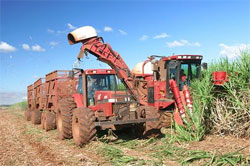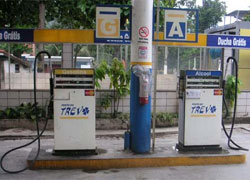Brazil’s ethanol can break oil monopoly
on
Brazil’s ethanol can break oil monopoly
Energy experts are calling on western governments to lift trade barriers for Brasilian ethanol. They point out that, in spite of the rise of the electric car, the transport sector will remain fuel-based for a long time and see massive environmental and strategic benefits in Brazilian bioethanol over petrol. Problem is, western energy policy is trumped by agricultural interests. ‘We can break the monopoly of oil. If we want to.’
 |
| Harvesting sugarcane |
Huge combine harvesters, their engines throbbing, eat their way through seemingly endless fields of sugarcane under the burning Brazilian sun. Row upon row of canes is cut and the crop thrown onto the trailer of the tractor driving alongside. Lorries with their metal cages full of cane toil in the direction of the sugarcane mill a few kilometres away. Dust, pulverized bits of cane and the black smoke billowing from the diesels hangs heavy in the air.
A chance passer-by wouldn’t know, but this is the harvest of one of the world’s most sustainable biofuels. Next to being used to process sugar, much of the cane is destined for the production of bioethanol. The crop grows quickly and it’s sustainable: as it grows it absorbs so much carbon dioxide that the resultant ethanol is virtually climate neutral.
Brazil’s production of sugar-based ethanol amounted to some 30 billion litres last year, around a third of current world production. As such Brazil ranks second only to the United States, where ethanol is produced from maize. But US farmers produce almost exclusively for the domestic market and the country is a net importer. Each year the US buys an additional 1.5 billion litres from Brazil, which ranks as the biggest bioethanol exporter in the world with annual exports totallng some five billion litres.
Brazil’s capacity for growth in biofuels has made it a key player on the world biofuels market. ‘Brazil has the land, the infrastructure and the ambition to triple its exports of sugar-based ethanol to more than 15 billion litres by 2020,’ says Andre Faaij, Professor of Energy System Analysis at the Copernicus Institute of Utrecht University’s Science Faculty. A biofuels expert, Faaij was one of the co-authors of the International Energy Agency’s Bioenergy Country Report on Brazil, published late last year.
Faaij is convinced that sugar-based ethanol will become a key determinant in the future traffic and transport fuels matrix. ‘There’s a lot to do about the electric car, but the transport sector will remain fuel-based for the greater part of this century,’ Faaij predicts. ‘The second generation of ethanol from sugarcane will claim its rightful place as an effective fuel.’
Already sugar-based ethanol offers the most favourable energy balance of all the biofuels. Each joule expended on production results in the creation of 9.3 joules. Compare that to maize, where the ratio amounts to 1:1.4. And Faaij believes that the efficiency of sugar-based ethanol can still be stepped up by a factor of three. ‘Just wait until the second generation and even third generation have been fully developed.’
Brazil is currently experimenting with the use of the hard stalks of the cane as a raw material for ethanol. In addition fuel can be produced from the residual cane waste, known as bagasse. Brazil already generates electricity by burning bagasse. Most of the bagasse mills are expected to generate sufficient energy within 20 years to sustain their own production and even to contribute a surplus to the national grid.
Ethanol pumps
But while the IEA predicts that Brazil will grow into one of the world’s biggest bioenergy suppliers by 2020, currently production is being squeezed because of high sugar prices and a stagnation in world demand. Trade barriers are also hampering further export growth – in 2009 Brazil’s exports of bioethanol even showed a decline on the previous year.
For the Brazilian Sugarcane Industry Association (UNICA) it’s a sign that bioethanol’s international market position is far from secure. Together UNICA members account for around 60 percent of Brazil’s production of sugar-based ethanol and as such they dominate a large part of the world market. ‘There are too many barriers, price fluctuations are extreme and demand is erratic’, says Marcos Sawaya Jank, UNICA president and ceo. ‘All these uncertainties make it difficult to build a healthy export industry in the short term.’
 |
| Gasoline on the left, Ethanol on the right |
‘Ninety percent of all cars sold in Brazil can run on both ethanol and fossil fuel’, says Jank. ‘Thanks to this flexible fuel car – and the 30,000 ethanol pumps throughout the country – motorists in Brazil are the only drivers in the world who can decide at the pump from one day to the next if they should fill up with ethanol or petrol.’
Today’s Brazil is reaping the benefits of the then government’s forward-looking policies, says Jank.’We’re plucking the fruits of that now.’ From his office in a business high-rise towering over Sao Paulo’s teeming city centre, he points to the two-lane traffic jam stretching back for miles that looks to have blocked all the streets in the area. ‘See that there? It’s bad enough as it is, just imagine what it would be like if all those cars were running on diesel or petrol. The city would be totally uninhabitable because of the pollution.’
Monopoly
Andre Faaij agrees wholeheartedly. ‘The environmental benefits of bioethanol over petrol are massive,’ he enthuses. ‘It’s a practically homogenous fuel, which means it burns better. The emissions of nitrogen, sulphur and particulate matter are far lower than those of fossil fuels. The carbon-dioxide balance is more or less neutral, and the raw material is sustainable. We can break the monopoly of fossil oil.’
For this reason alone, scientist Peter Zuurbier of the Dutch University of Wageningen would have liked to see Europe and the United States similarly opt for a more sustainable energy matrix. ‘Then our cities would have had far fewer problems, we would have been less dependent on oil-exporting countries and we would have been part way to solving the energy issue,’ says Zuurbier, currently professor at the Agricultural Faculty of the University of Sao Paulo.
But the West still lacks a clear energy strategy even now, Zuurbier says. Countries have stimulated the growth of energy crops grown by their own farmers rather than looking at the energy balance and the most effective use of available land. Agricultural policy takes precedence over energy politics, agrees Andre Faaij.
Zuurbier believes that Europe and the United States could profit from Brazil’s experience in bioethanol. ‘Years of implementing bioethanol solutions mean that Brazil has built up considerable expertise. They’ve built up an infrastructure, and know how it can be rolled out cheaply. And even the flexcar can easily be introduced all over the world: all the major car makers have adapted their vehicles for the Brazilian market.’
Brazil is not just looking to boost its ethanol exports, it’s also keen to sell its expertise. ‘It’s almost as if Europe is scared of becoming dependent on Brazil, but that’s not the Brazilian government’s aim at all’, says Zuurbier. On the contrary, ‘Brazil wants other countries to start producing bioethanol as well, in order to create a truly broad-based world market.’
Faaij believes that Brazil is confident enough to branch out further : ‘It’s no coincidence that the IEA has concluded that Brazil is the only country in the world able to meet the increasing demand for ethanol in the medium term. Eventually the West will come to realise this and act accordingly.’
Barriers
At the same time Zuurbier asserts that it is an illusion to think that trade barriers will be lifted in the near future. UNICA’s Jank is also realistic on this score. On the public stage world trade blocs are pursuing sustainability, he says, but behind the scenes they’re concerned above all with protecting their own farming sectors. ‘That’s why the Western trade blocs are still blocking large-scale imports of bioethanol,’ he says.
Such barriers to imports include high import duties and rigorous criteria on sustainable production, imposed in response to the negative image that has grown up around biofuels. These criteria stipulate biofuel production cannot be allowed to compromise food production or impact adversely on bio-diversity. ‘Politicians – but a lot of scientists too – have tended to remain mired in a generalized critique of biofuels’, says Zuurbier. ‘But these criticisms don’t apply at all, or to a far lesser extent, to sugarcane-based ethanol.’
As an example he cites legislation passed by the Brazilian government in 2008 to counter deforestation. ‘Of course there’s still a lot wrong with what’s happening to the rainforests, but sugarcane is not the cause’, he says. ‘The sugarcane plantations are expanding into grasslands, which are quite often unused.’
 |
| Marcos Sawaya Jank, President and CEO of UNICA |
Nor does the production of sugar-based ethanol - unlike ethanol derived from maize - compete with food production, according to biomass experts. Zuurbier: ‘Sugar prices are high, that’s true, but that’s because production in India has collapsed, and not as a result of ethanol production.’
However ethanol production is suffering from higher sugar prices, particularly in conjunction with falling oil prices. ‘From that point of view Brazil is in rather a bind’, says Zuurbier. ‘Sugar is a good earner, and for that reason the plantations will likely hike their production of sugar at the expense of ethanol. That’ll push ethanol prices up, which will make it more difficult to compete with fossil fuels.’
That price is a key factor is borne out every day at the pump. Brazilian motorists will continue to pump ethanol as long as it costs less than 70 percent of petrol, because that’s how efficient it is relative to the fossil fuel. ‘Once the price rises above that, motorists go for petrol en masse and demand for ethanol collapses,’ says Jank. ‘For Brazilians, money talks louder than the environment.’
|
Biofuel breakthroughs Once the preserve of the environmental fanatic with a car converted to run on salad oil, bio-fuels are fast becoming mainstream. Public transport, airlines and even the racing car industry are increasingly making the switch. Worldwide, the number of teams racing on bio-fuels has increased significantly. The United States boasts various competitions for racing cars running on bio-fuel while the number of bio-ethanol powered teams competing in conventional races is also increasing. Even the arduous Paris-Dakar rally has attracted various biofuel-based teams. The airline industry is also experimenting with the use of bio-fuels. In March Dutch airline KLM scored an industry first when it announced it would start using bio-fuels to part-power flights. The airline is currently working both with ethanol and oil derived from algae. The use of biofuels for public transport is becoming increasingly popular. Over the next few years the Sao Paulo city authorities are due to take delivery of 200 metropolitan buses running on biofuel. The buses, developed by Scania, are already in use in Sweden which developed the special additive necessary to make bioethanol suitable for use in diesel engines. If this trend develops further, the environmental gains will be far greater than only consumer cars running on biofuel. |
Moral debate
Bio-energy growers in the United States and Europe are fearful of the competition Brazilian ethanol will bring. US maize farmers, in particular, fear being forced out of the market if bioethanol becomes freely available on the American market. And that’s why the US government keeps import prices high and maize-based ethanol prices artificially low. ‘That’s how the US remains the world number one producer of bioethanol’, Jank maintains.
Worse still, Faaij believes, is that maize-based ethanol drives up food prices, and the image of all biofuels suffers as a result. ‘In Mexico the people suddenly coudn’t afford to buy burrito’s any more. Coming on top of the deforestation and loss of natural habitat that resulted from the large-scale cultivation of energy crops this led to a moral debate about whether bio-fuels didn’t wreak more damage than they were worth.’ As a result environmental groups and the general public now tend to regard biofuels as a bad thing, Faaij points out.
‘No distinction was – or is – made between the different types of bio-fuel,’ notes Zuurbier. Biofuels’ image has suffered enormously – including that of sugarcane-based ethanol, which is now subjected to ‘extreme criteria’ on sustainability.
Such barriers have not only blocked a major breakthrough for sustainable energy sources, but they’re also a double standard, Zuurbier points out. ‘Effectively you’ve got two stalks of sugarcane growing alongside one another. The one that’s pulverized to make sugar can enter Europe unrestricted, while the other that ends up as ethanol is subjected to a huge number of additional production stipulations.’
The manager supervising the sugarcane harvest under the hot Brazilian sun dreads the red tape that these international criteria inevitably entail. As the combine harvester lurches heavily into a u-turn to toil back down the field he explains how it works: the entire harvest is thrown into the same trailer. There’s no selection for sugar production or ethanol. ‘Sugarcane is sugarcane’, the foreman shouts, barely audible above the thunder of the approaching harvester.
|
IEF study: only Brazilian ethanol passes muster The International Energy Forum, the prestigious Riyadh-based umbrella organisation of the energy producing and consuming countries, last month published an assessment of the potential and limitations of biofuels. As may be expected of an organisation that leans heavily on oil producing countries, the report – written by Adnan Shihab-Eldin and former Executive Director of the International Energy Agency Claude Mandil – is highly critical of biofuels. As to the first-generation biofuels (i.e. made from agricultural commodities that can also be used as food, e.g. sugarcane and maize or corn), the report concludes that ‘there is a clear consensus that only one is acceptable …: this is ethanol produced from sugarcane in Brazil…. All the other biofuel crops (e.g. corn ethanol) currently in commercial production offer poor GHG [greenhouse gas] results at very high prices or with unacceptable environmental impacts (e.g. palm oil diesel). Even on the grounds of energy security most do not seem attractive and there is concern that farm policy might be the only serious … reason for developing these biofuels.’ About the so-called second generation biofuels, made from raw materials that cannot be used for food and therefore do not compete with the food chain, the IEF report notes that ‘Despite the large R&D efforts and sizable investments being made by public and private organizations in major OECD countries, progress in the development and commercialization of next generation biofuels has been slow. Notwithstanding the early targets set by several countries, it is not likely that next generation biofuels will become commercially available on a large scale before another decade or so, at the earliest.’ The report also notes that by setting ambitious biofuels targets, western (oil-importing) countries have added to oil exporting countries’ uncertainty about demand growth in their export markets. This, says the report, ‘has increased energy security risk in the medium-to-long term, as oil producers become more reluctant to commit to making timely investments.’ See the IEF report Assessment of Biofuels; Potential and Limitations Much of the criticism of biofuels in the IEF-report is substantiated in another recent study, published by UNEP (United Nations Environmental Program). This report notes that lifecycle assessments of biofuels are still highly inadequate in many cases, leading to much uncertainty about the actual environmental effects of biofuels. Apart from the effect on greenhouse gas emissions, other environmental effects (e.g. eutrophication and biodiversity effects) need to be taken into account, UNEP notes. The report notes that biofuels are already in many ways ‘contributing to signficantly worsened environmental quality in certain regions.’ It also states that ‘increased biofuel production is expected to have large impacts on biological diversity in the coming decades, mostly as a result of habitat loss, increased invasive species and nutrient pollution’. When it comes to climate change, ‘the mitigation potential of biofuels to date are rather minimal overall and the costs so far seems disproportionally high’. The UNEP-report notes that subsidies to biofuels in the US, Canada and the EU lead to costs of between $960 to $1700 per ton of CO2 avoided – far exceeding the value of carbon emissions in traded markets (currently below $20 per ton!). See the United Nations Environment Programme report Towards sustainable production and use of resources: Assessing Biofuels |


Discussion (0 comments)